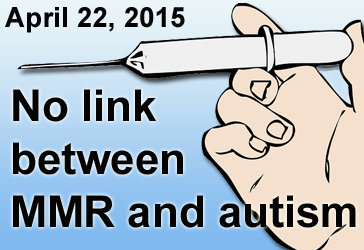Check out other stories from the Latest News
New Study Finds No Link Between Autism and MMR
By Chelsea E. Toledo, M.A. on April 22, 2015

Background: Pediatricians recommend that children receive a vaccine to protect them from measles, mumps, and rubella (MMR) between 12 and 15 months of age, and then again between 4 and 6 years of age. However, the belief that these shots increase children’s risk of developing autism spectrum disorder (ASD) has contributed to a decrease in vaccination rates, threatening herd immunity.
What’s new: On April 21, 2015, the Journal of the American Medical Association published a large-scale study on the prevalence of ASD in vaccinated and unvaccinated children, all with older siblings—as children who already have a sibling with the disorder are considered to be at higher risk. The researchers looked at insurance claims data from 95,727 children between the ages of 0 to 5, 994 of whom had been diagnosed with ASD. They found that the risk of diagnosis was nearly identical for children who had been vaccinated versus those who had not. In addition, they determined that the risk of ASD did not increase following administration of MMR vaccines in children whose older siblings already had the disorder.
Why it’s important: This study adds to a wide body of research conducted over the past 15 years challenging the link between vaccines and ASD. The study also shed light on low vaccination rates among children whose older siblings had an ASD diagnosis—which the researchers attribute to the ongoing belief among affected families that vaccines led to their children’s ASD status.
Help me understand :
| Source(s) : |
| Tweet |

